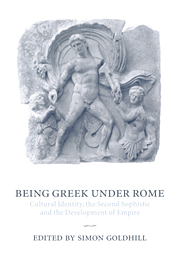Book contents
- Frontmatter
- Contents
- List of contributors
- Introduction: Setting an agenda: ‘Everything is Greece to the wise’
- 1 Subjected to Empire
- II Intellectuals on the margins
- III Topography and the performance of culture
- 7 ‘Greece is the World’: exile and identity in the Second Sophistic
- 8 Local heroes: athletics, festivals and elite self-fashioning in the Roman East
- 9 The Rabbi in Aphrodite's bath: Palestinian society and Jewish identity in the High Roman Empire
- List of works cited
- Index of major passages discussed
- General index
9 - The Rabbi in Aphrodite's bath: Palestinian society and Jewish identity in the High Roman Empire
Published online by Cambridge University Press: 22 January 2010
- Frontmatter
- Contents
- List of contributors
- Introduction: Setting an agenda: ‘Everything is Greece to the wise’
- 1 Subjected to Empire
- II Intellectuals on the margins
- III Topography and the performance of culture
- 7 ‘Greece is the World’: exile and identity in the Second Sophistic
- 8 Local heroes: athletics, festivals and elite self-fashioning in the Roman East
- 9 The Rabbi in Aphrodite's bath: Palestinian society and Jewish identity in the High Roman Empire
- List of works cited
- Index of major passages discussed
- General index
Summary
Jews in Palestine in the second and third centuries
There is something reassuring in contemplating Herodian Jerusalem, the environment which formed Josephus, the author of the Jewish Antiquities. Here was a city whose public spaces featured the best that Italian and imperial Greek architecture had to offer, and whose elites gloried in their friendships with local dynasts and Roman grandees and decorated their houses with mosaics and frescoes very much like those of precisely contemporaneous Pompeii. But in other respects, Jerusalem was radically different from Greco-Roman cities. For Jerusalem was not merely the chief city of Judaea, but the metropolis of the Jewish ethnos. Its fixed population was small, but the scale of the most conspicuous of its public buildings, the temple precinct dedicated to the God of Israel, was massive – only the temple precincts of Ephesus and Pergamon could compete. Its public space was also transgressive in being largely devoid of statuary. Neither gods nor emperors were anywhere to be seen. The houses of the elites were likewise devoid of figurative decoration. The items borrowed from the repertoire of Greco-Roman urban culture had been pressed into service to display not only Jerusalem's participation in that culture, but also its essential remoteness from it – an ambiguity which mutatis mutandis characterized also the most important literary artefacts of first-century Judaism, the writings of the Jerusalemite priest Josephus
This pleasing congruence of material and literary culture disappears in the second and third centuries. Following two failed revolts against Rome, Judaea was de-judaized.
- Type
- Chapter
- Information
- Being Greek under RomeCultural Identity, the Second Sophistic and the Development of Empire, pp. 335 - 361Publisher: Cambridge University PressPrint publication year: 2001
- 5
- Cited by



